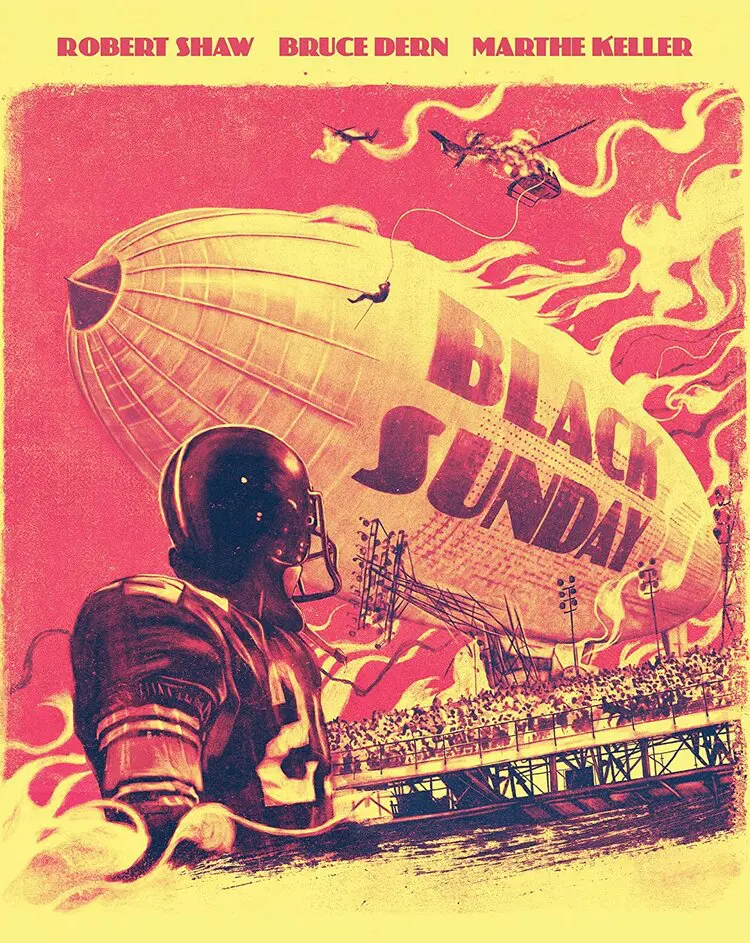
It gets off to a fast start. Yet Black Sunday (1977; dir. John Frankenheimer), one of the better disaster flicks of the ‘70s, isn’t afraid to take its time. Based on the Thomas Harris novel of the same name, the movie is a pressure cooker. Once the aerial climax arrives, we’re ready for it; and then the movie becomes a silly goof.
Her name is Dahlia Iyad (Marthe Keller). Her game, and that of her Palestinian comrades in the Black September group, is to unleash a vicious suicide attack on American soil in retaliation for the U.S. support of Israel. And her weapons? A Goodyear blimp full of steel flechettes and its pilot, Michael Lander (Bruce Dern), a former POW. Lander’s the walking dead. His sole reason to live is to punish the U.S. for what it did to him and his brothers-in-arms in Vietnam. While Lander & Iyad negotiate the terms of their pairing (one that’s sexual yet bound to the cause that drives them), David Kabakov (Robert Shaw), a Mossad counter-terrorist agent, is hellbent on hunting them. He needs the U.S. government’s help—and they must act now. Lander & Iyad have their eye on Miami—Super Bowl X, to be exact. Can Kabakov stop these terrorists before they sacrifice themselves to blow up a stadium full of sports fans?
Frankenheimer and crew do efficient work. The John Williams score is fine, as are the cinematography (John A. Alonzo) and the editing (Tom Rolf). Technically, Black Sunday is mostly sturdy filmmaking.
The movie chills because the premise is plausible (or was in the mid-’70s).
As a character, Iyad fascinates. She’s composed, a level-headed if bloodthirsty operative—confident and patient—tender toward Lander. Kabakov is a hard, flinty man. For all his heroics, there’s a tiredness to him, a resigned air. He’s not above sparing a life, even if the act proves regrettable.
Keller and Shaw do respectable work—but Dern amazes. Lander is nuts. Yet Dern sells us on how this man has become a broken shell; on how he turned his patriotism (and his potential to be a wonderful human) into evil. In an astonishing scene that caught me off-guard, Lander breaks down in front of Iyad. It’s powerful, gut-wrenching stuff. Lesser films would have screwed this moment up, may have even dispensed with it. We don’t want Lander & Iyad’s plot to succeed, but the movie refuses to paint them in broader strokes. As a result, we become more invested in the movie and the movie becomes more gripping.
Frankenheimer shot parts of the climax at Super Bowl X. This gives the movie a hot dose of authenticity. When chaos erupts at the game, you feel you’re watching something true unfold. Then, despite the goodwill the movie has earned, the process shots of Kabakov as he uses a helicopter to corral a blimp louse things up. The sheer wow-ness of the climax is something. As filmed, though, the flimsy outlandishness of Kabakov’s stunt mars the movie. It spoils the illusion the rest of the movie works so hard to create. It’s—silly.
Still, Black Sunday is solid, above-average entertainment. At the box office, it grossed twice its budget. So, you may ask, why is it an underappreciated, semi-obscure film?
Do viewers want to spend this much time watching a disaffected POW plot mass murder? (Taxi Driver, a beloved hit, covers similar ground.) Lander isn’t a cool antihero. We understand him, even sympathize with him (a tad), but he’s still a bad guy—and yet Black Sunday isn’t a character study. I don’t know. I could strain to theorize. Dern’s portrayal offers a glimpse at a more intriguing version of the story.
Frankenheimer soaks Black Sunday in realism. The movie doesn’t paint the main characters in super-broad strokes. As ridiculous and lame as parts of the climax are, it’s still an adrenaline rush. On top of everything else, Bruce Dern gives a career-best performance.
If you’re in the mood for a smart, crackerjack thriller ripped from older headlines by a skilled team of filmmakers, Black Sunday may be your cup of meat.
Arrow Video’s Special Edition Blu-ray doesn’t have an exceptional print of the film (it’s pretty grainy), but—as a commemorative release, Arrow delivers the goods. The first pressing has an illustrated collector’s booklet with new writing on the film by Barry Forshaw. Other material includes an image gallery, a reversible sleeve that features artwork by Peter Strain, a portrait of Frankenheimer (from 2003), a visual essay by critic Sergio Angelini, and a new audio commentary by film scholar Josh Nelson. The Arrow set also has restored lossless mono audio and restored lossless 5.1 and 2.0 stereo audio options.